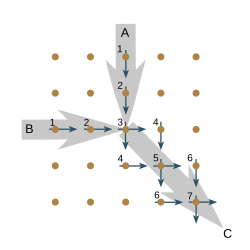
Calculating Space (German: Rechnender Raum) is Konrad Zuse's 1969 book on automata theory. He proposed that all processes in the universe are computational.[2] This view is known today as the simulation hypothesis, digital philosophy, digital physics or pancomputationalism.[3] Zuse proposed that the universe is being computed by some sort of cellular automaton or other discrete computing machinery,[2] challenging the long-held view that some physical laws are continuous by nature. He focused on cellular automata as a possible substrate of the computation, and pointed out that the classical notions of entropy and its growth do not make sense in deterministically computed universes.
- ^ Cite error: The named reference
Zuse_1967_RRwas invoked but never defined (see the help page). - ^ a b Cite error: The named reference
Mainzer-Chua_2011was invoked but never defined (see the help page). - ^ Cite error: The named reference
Müller_2014was invoked but never defined (see the help page).